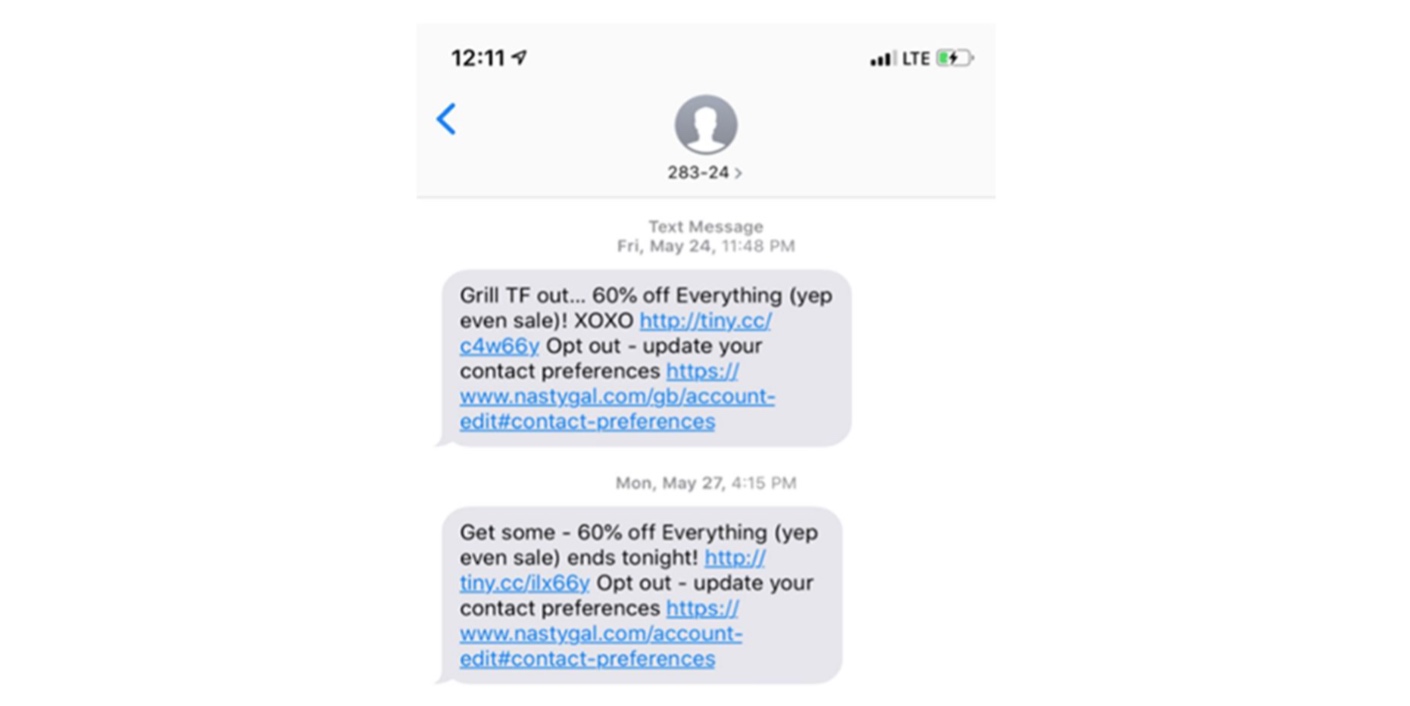Nasty Gal is on the receiving end of a new $5 million-plus lawsuit – but instead of a discrimination case or one centering on copyright infringement, which it has been sued for in the past, the Los Angeles-based fast fashion brand is being taken to court for allegedly “engaging in unsolicited marketing” by sending unsolicited text messages to thousands of consumers.
According to the complaint that Amanda Defranks filed in a Florida federal court late last month, Nasty Gal has run afoul of the Telephone Consumer Protection Act (“TCPA”) by sending her – and “several thousands [of other consumers], if not more” – promotional text messages without her consent. “At no point in time,” Defranks asserts, “did [she] provide [Nasty Gal] with her express written consent to be contacted using an automatic telephone dialing system,” which the TCPA says covers the transmission of text messages, as well as telephone calls.
In addition to simply violating the TCPA’s mandate against sending unsolicited text messages, i.e., messages aimed at promoting a brand and/or its products without first obtaining a consumer’s express written consent, Defranks alleges that Nasty Gal’s sending of the messages, themselves, “caused [her] actual harm, including invasion of her privacy, aggravation, annoyance, intrusion on seclusion, trespass, and conversion,” as well as “inconvenience.”
 image via complaint
image via complaint
With the foregoing in mind, Defranks claims that Nasty Gal has “knowingly and/or willfully” violated the TCPA, and she has asked the court to award her actual and statutory damages of more than $5 million, and injunctive relief, barring Nasty Gal from further violating the TCPA. Still yet, she has asked the court to approve her proposed class action and thereby, enable “all persons who from four years prior to the filing of this action were sent a [unsolicited, promotional] text message by or on behalf of Nasty Gal” to join her lawsuit.
Defranks’ counsel asserts in the complaint that “if [her] claim that [Nasty Gal] routinely transmits text messages to telephone numbers assigned to cellular telephone services is accurate, [Defranks] and the class members will have identical claims capable of being efficiently adjudicated and administered” by way of a single case. The court should approve the class action suit, the complaint further argues, as “individual litigation of the claims of all members of the class is economically unfeasible and procedurally impracticable.”
More than that, “the likelihood of individual class members prosecuting their own separate claims is remote, and, even if every member of the class could afford individual litigation, the court system would be unduly burdened by individual litigation of such cases.”
UPDATED (March 13, 2020): By way of a filing signed by Judge Darrin P. Gayles on March 13, the case has been closed in its entirely “in light of Plaintiff’s Notice of Settlement, which indicates that this matter has settled in full.” The development comes on day after counsel for Defranks filed a notice indicating that the parties had settled their differences out of court. While the terms of the parties agreement are confidential, “they must file a Stipulation or Notice of Dismissal and/or Settlement Agreement along with any other pertinent document necessary to conclude this action” within 30 days, according to the court.
*The case is Amanda Defranks v. NASTYGAL.COM USA INC., 1:19-cv-23028 (S.D.Fla).











